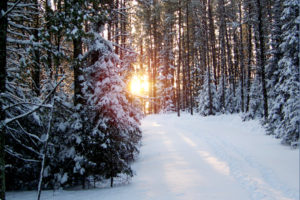Winter is Here. Are You Ready?
by rawevil
We were destined to have this happen. We live in Wisconsin. Whether we were ready or not this season, Old Man Winter finally decided to show his frozen face to us on December 28th. He graced us with anywhere from 6-18″ of snow depending upon where we live. Most of us who belong to the WGA are from this area or the Upper Midwest and laugh at the thought of a foot of snow stopping us from a caching trip. Playing in the snow and cold can be fun. It can also be challenging and dangerous if you are not prepared.
Our winter geocaching gear is a lot different this time of year than it is in spring, summer, and fall. After asking a few friends in the geocaching community what they have in their proverbial wallet, we came up with a list that is essential to staying safe and warm while seeking out that elusive cold-weather cache. Before we get into the details, let’s start out with the basics of making certain your geo-mobile is as ready to go as you are.
Have you checked to make sure you have enough fuel? Have you cleaned off your head and tail lights? Do you have enough windshield washer fluid to get you to and from your destination so you can see safely? Are your tires going through male-patterned baldness? If not, stay home and rethink your strategy of that FTF or Lonely Cache. You are only as good as the means to get you to your destination.
When you finally arrive at your destination, we believe that there are at least five categories that are important to make sure you are safe and warm during your trek.
- Clothing
Make sure your skin is protected and you dress in layers if you are planning a significant hike. Three layers is the rule of thumb. A base layer that conforms to your body. Avoid cotton and choose wool or synthetic materials. A middle layer, like fleece, helps to keep in your body heat. An outer layer that is both wind and waterproof. Flannel-lined pants, snow pants, or gaiters that go over your clothing, are always good for hiking through deep snow. Always keep your fingers and toes warm and toasty by investing in a decent pair of gloves and boots that are insulated and waterproof. Add crampons to your footgear for extra traction. If you decide to cache on a blizzard-like day, wear hi-vis vests or clothing while grabbing that PNG. Don’t forget the eye protection and sunscreen! Snow blindness is not fun. And yes, you can get a sunburn in winter. Lastly, when you accidentally stick your foot in a stream that is not frozen and have to walk back to the geo-mobile, an extra pair of socks and shoes is always most welcome.
- Extra Power
Cold weather is a huge burden to your batteries and electronics. Keep plenty of extra batteries on hand that are not exposed to the elements. If you have them in your geo-bag, think about putting them in your pocket to keep them warm. And if you have a cell phone, make certain you are fully charged or at least have a battery back up in case your power runs low.
- Food & Water
Winter hiking can be arduous so be sure to take in plenty of fluids and choose snacks and food that provide energy and nourishment if going on that expedition. Skip the chips and candy bars and reach for trail mix, beef jerky, and dried fruit. Cheese is a good source of protein, so pack the sticks and head out as they will be well refrigerated in your geo-bag.
- Tools of the Trade
How do you sign your log sheet? A pen? Most people do. However, pen ink can freeze in the bitter-cold weather. Think about bringing along a pencil. Small shovels cannot only help you if your car gets stuck, they can also help dislodge a cache from Old Man Winter’s frozen grasp. We have found that hand warmers also help if you leave that cache and come back to it later if given enough time. First Aid Supplies are ALWAYS a must and never out of season. Flashlights and mirrors also come in handy as the daylight hours have dwindled into mere hours.
- Location
The best tip we had about caching, whether in winter or at any other time of the year, was to let someone know where you are going. Your GPS may tell you where to go and how to get there, but if there was an emergency, someone needs to know how to get to you! Be open about your plans.
There are many more safe caching tips and tricks for winter but hopefully these gave you the basics whether it is your first time winter caching or a reminder of the things you may have forgotten over the years. It’s common sense. And please, know your limits.
Cheers to a safe and happy winter caching season!

Comments are closed